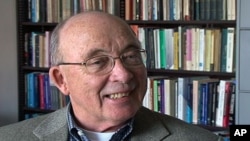Northwestern University Economics Professor Dale Mortensen is one of three co-recipients of the 2010 Nobel Prize for Economics. He shares the prize with Peter Diamond from the Massachusetts Institute of Technology, and Christopher Pissarides from the London School of Economics and Political Science. The trio will accept the award on December 10 in Stockholm, Sweden.
When the call came from the Royal Swedish Academy of Sciences in October, Northwestern University Professor Dale Mortensen was far from his home in Chicago, teaching in Denmark… and was caught off guard.
It was the phone call that many seek, but only few receive.
"You don't know that's it's coming at any particular time," he said.
For Mortensen, a pioneer in the field of job search and search unemployment theory, the Nobel Prize for Economics caps a long career studying labor markets.
"Typically in Economics you win the prize for building models, for creating the structure within which to think about a problem," he explained.
The problem before Mortensen was trying to explain why there were so many people unemployed at the same time there are a large number of job vacancies.
"What I'm trying to do is study the process that allocates workers to jobs. Alright, and particularly through that process identify where there might be glitches or where there might be in fact frictions that could be eased," he said.
Mortensen's Nobel prize-winning research boils the process down into a complex mathematical model that helps economists understand the length of time it takes workers to find jobs, and for employers to find workers.
That knowledge, says Mortensen, helps guide economic policy.
"The application of those ideas in the labor market is fairly obvious because one of the manifestations of these costs is that it takes time to find a job, and it takes time to fill a job," Mortensen said. "So what we see are unfilled jobs and unemployed workers trying to look for each other, and that process is important in understanding how labor is allocated across alternative uses as well as what the price, in this case, wage, how the process by which that is determined."
The national unemployment average in the United States is currently above nine percent. Unemployment benefits for two million people will be ended at the end of December unless the U.S. Congress passes legislation to extend it.
Mortensen says you don't need a mathematical model to understand the implications of lingering high unemployment.
"What it tells us is that until some confidence in the business community is found, or stimulated, that we might have a long crisis," he said. "And there are various aspects to that because of course this crisis was associated with if not caused by a financial crisis."
Mortensen says using his model to understand the disconnect between employers and job seekers could help policy makers and employers avoid high unemployment in the future.
"Employers for example have to make investments in job creation. And that means they have to be forward looking, so they have to have expectations about the future that say, investing in jobs now would be profitable," he said.
This was not the first year Mortensen and his fellow co-recipients have been considered for the Nobel. But he thinks current economic trends globally may have influenced some of the judges on the Nobel selection committee.
"I'm sure that the committee thought it wouldn't be a bad time, considering it might add to the news, but as I've said, we've certainly been under consideration for five to six years," Mortensen said.
Along with the gold Nobel medallion, Mortensen receives a cash award that equals about $1.5 million. He accepts the award in Stockholm, Sweden December 10.




